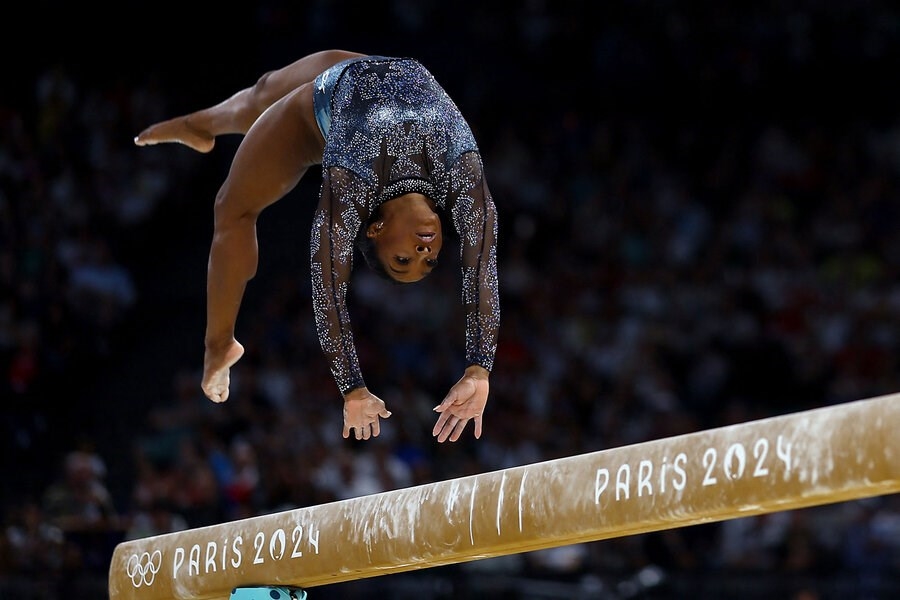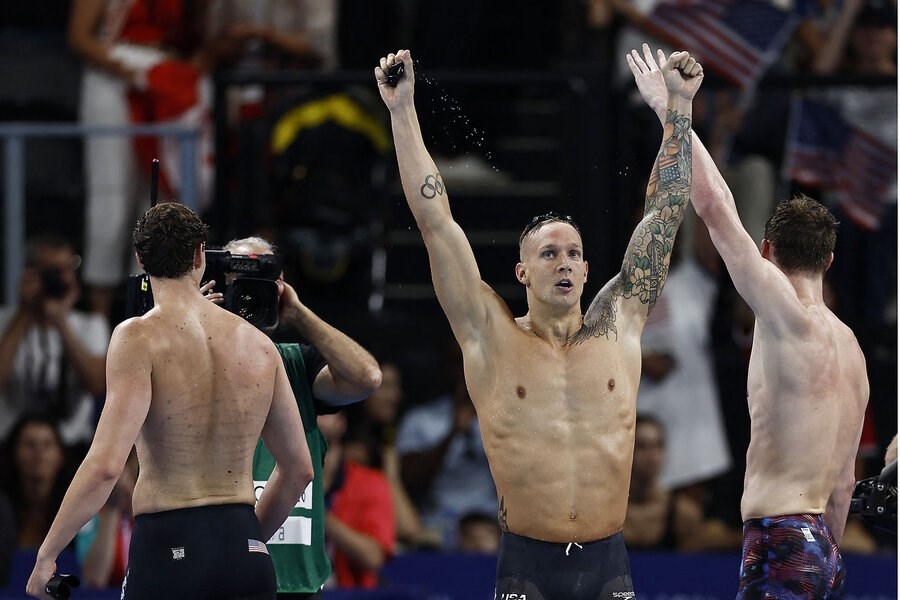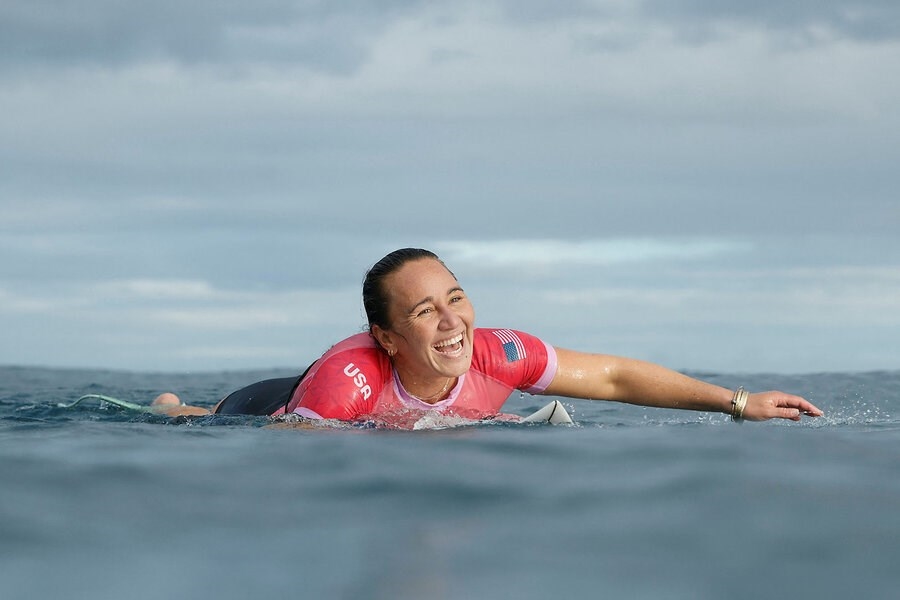REPRINTED WITH PERMISSION FROM THE CHRISTIAN SCIENCE MONITOR
Previous generations of Olympic athletes were expected to perform with smiles on their faces, even when dealing with physical pain, mental trauma, or outright abuse. Today’s athletes are more open about their battles, and say that honesty about mental health has led to a better balance in their lives.
 Gymnast Simone Biles of the United States performs on the balance beam during the Olympics in Paris, July 28, 2024. Hannah Mckay/Reuters
Gymnast Simone Biles of the United States performs on the balance beam during the Olympics in Paris, July 28, 2024. Hannah Mckay/Reuters
| PARIS - Gymnast Simone Biles is not only smiling at the Olympics again. She is also competing. So is swimmer Caeleb Dressel. Both highly decorated athletes left their sports after the last Olympics in Tokyo to take a mental health break. Both weren’t sure they would be back.
Over the weekend, Ms. Biles pushed through a calf injury and led the U.S. women’s gymnastics team to a first-place finish in the team qualifying round, expertly performing a vault, for example, that is considered the most difficult in the world. Mr. Dressel anchored the last leg of an explosive men’s 4x100 freestyle relay – helping to deliver the country’s first gold medal of the Paris games.
Their crowd-wowing performances demonstrate their resilience and determination. But their comebacks have also broadened the discussion around support for mental health among Olympians – and offer examples of how athletes have sought their own approaches to navigating balanced lives.
“Some athletes have been courageous enough to talk about the challenges that it takes to develop those coping skills,” says Joel Fish, who runs the Center for Sport Psychology in Philadelphia and has worked with Team USA’s women’s field hockey and soccer teams.
The pressure to win at the Olympic and pro level “has become so intense,” he adds. Dr. Fish cited the immediacy of intense feedback from social media as a game changer for added pressure on athletes. Being placed under a microscope enhances the pressure to win, he says. Athletes need to develop a sense of themselves that is independent of their sport.
“They stand a better chance when they’re under the major spotlight like the Olympics,” Dr. Fish says, “because their identity isn’t wrapped up in how they perform.”
Ahead of the women’s gymnastics debut on Sunday, former Olympian and gymnastics coach Chellsie Memmel spoke about Ms. Biles’ mindset.
“Seeing her now, I think she’s in a really good place,” Ms. Memmel says. “She’s excited about gymnastics, she’s enjoying it, and I think this is a redemption for her.”
Although athletes’ mental health has always been a concern at the Olympics, Ms. Biles surprised the world in Tokyo in 2021 when she resigned from most of the competition due to a case of the twisties – a dangerous disconnect between her mind and body while in the air. That year, she was part of the silver-medal winning women’s team and earned a bronze medal in the individual balance beam event.
 Clodagh Kilcoyne/ReutersCaeleb Dressel of the United States celebrates after winning gold in the men's 4x100 freestyle relay at the Paris Olympics July 27, 2024.
Clodagh Kilcoyne/ReutersCaeleb Dressel of the United States celebrates after winning gold in the men's 4x100 freestyle relay at the Paris Olympics July 27, 2024.
In 2022, Mr. Dressel – fresh off winning five gold medals the previous year in Tokyo – took an eight-month break from swimming after withdrawing from the world swimming championships. Like Ms. Biles, he turned to therapy for help.
Other Olympians have also struggled – with anxiety, eating disorders, and emotional breakdowns. The United States Olympic and Paralympic Committee (USOPC) has responded in recent years by hiring new mental health staff.
“I do think that athletes speaking up more has helped us drive the conversation around mental health and well being – and being able to take a break and be able to take care of your mental health,” Jess Bartley, USOPC senior director of psychological services, said at an Olympic media event in New York in the spring.
She credits athletes advocating for themselves, and adds that overall there has been a move toward destigmatizing mental health awareness.
Dr. Bartley was hired in December 2020 after the Tokyo Games were postponed due to COVID-19. She and her then-six-member staff of mental health specialists saw some of the first instances of athletes who had trained for four years feeling deflated because they couldn’t compete.
She now has a staff of 15 people, all of whom are on the ground in Paris. Before they arrived, her team took steps such as making sure every competing athlete went through at least one mental health screening annually.
“I think there’s a lot of gratitude for the resources,” said Dr. Bartley, who added that her office is integrated into the national governing bodies of Olympic sports.
Surfer Carissa Moore, a five-time world champion and Tokyo Olympic gold medal winner, says she’s dealt with challenges on her ladder to the top.
 Ben Thouard/ReutersU.S. surfer Carissa Moore reacts during her heat at the Olympic surfing competition in Teahupo'o, Tahiti, July 27, 2024.
Ben Thouard/ReutersU.S. surfer Carissa Moore reacts during her heat at the Olympic surfing competition in Teahupo'o, Tahiti, July 27, 2024.
“I actually hit a mental slump post-winning my third world title,” she explained at the spring media event. She added that she felt like she was competing for everyone else at one point.
“I hit rock bottom and was a bit depressed, had feelings of anxiety, and that’s when I decided that, ‘OK, things have got to change. Surfing has always been joyful,’” she said.
After surfing the waves in Tahiti in 2024 at the Olympics, Ms. Moore plans to step away from competing for a time. She wants to start a family with her husband and enjoy life outside the sport. But it took a while to get to a place where she has peace of mind, and getting there included the help of a psychologist.
Dr. Fish, who has also been a consultant for professional sports teams, advocates for athletes learning coping skills sooner rather than later. He says some of the ways to combat the pressure include managing stress, using positive self-talk, doing breathing and focusing exercises, visualizing, and trying other forms of mental preparation.
He credits the work that colleges and universities are doing with identifying ways to help young athletes with mental health problems. It is especially important for young athletes to develop identities that include not only sports but also personal interests, he says.
Ms. Biles’ support for herself includes a tattoo on her collarbone of the words “and still I rise,” a nod to a poem by Maya Angelou. The gymnast says in a new Netflix docuseries that the phrase is “the epitome of my career and my life story,” because it is what she’s always done after traumas and downfalls – risen.
She recently told “Today Show” co-anchor Hoda Kotb about when her journey back began. “One day I just woke up,” Ms. Biles said, “and I was like, ‘OK, let’s try this again.’”
Page created on 8/23/2024 10:52:42 AM
Last edited 8/23/2024 11:12:45 AM
